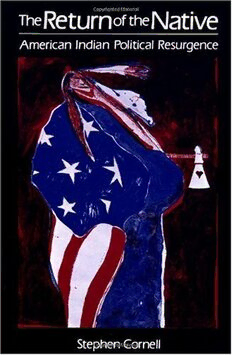
The Return of the Native: American Indian Political Resurgence PDF
289 Pages·1990·17.568 MB·English
Most books are stored in the elastic cloud where traffic is expensive. For this reason, we have a limit on daily download.
Preview The Return of the Native: American Indian Political Resurgence
Description:
An incisive look at American Indian and Euro-American relations from the seventeenth century to the present, this book focuses on how such relations--and Indian responses to them--have shaped contemporary Indian political fortunes. Cornell shows how, in the early days of colonization, Indians were able to maintain their nationhood by playing off the competing European powers; and how the American Revolution and westward expansion eventually caused Native Americans to lose their land, social cohesion, and economic independence. The final part of the book recounts the slow, steady reemergence of American Indian political power and identity, evidenced by militant political activism in the 1960s and early 1970s. By paying particular attention to the evolution of Indian groups as collective actors and to changes over time in Indian political opportunities and their capacities to act on those opportunities, Cornell traces the Indian path from power to powerlessness and back to power again.
See more
The list of books you might like
Most books are stored in the elastic cloud where traffic is expensive. For this reason, we have a limit on daily download.
